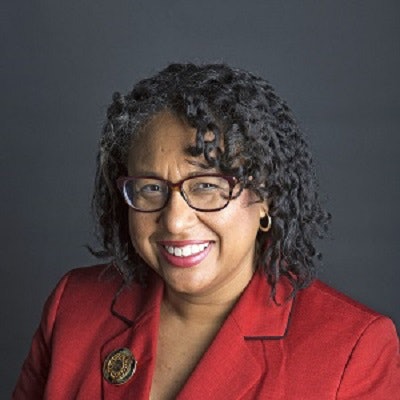“The basis of our governments being the opinion of the people, the very first object should be to keep that right; and were it left to me to decide whether we should have a government without newspapers or newspapers without a government, I should not hesitate a moment to prefer the latter.”
~ Thomas Jefferson
The value of a free press became evident to me long before I became dean of one of the nation’s top communications schools.
As a high school student journalist in Gahanna, Ohio, I first began to understand the importance of our First Amendment rights, and the responsibility that came with asking tough questions and empowering others through information. We informed students about school-board issues, athletics, entertainment, and social issues affecting our community and generation. Our stories aimed to inform, prompt conversations and help students, teachers and the wider community participate in informed discourse and civic engagement. These truths – that the press is a partner, aids the people and the government and is not the enemy – were already obvious to me, a budding reporter with little real-world experience outside my Columbus suburb.
 Dr. Rochelle L. Ford
Dr. Rochelle L. FordWhat truths are obvious to me today?
Journalism – much like it did back when I was a student at Gahanna Lincoln High – offers us a place to exchange ideas, a crucial component of any free society. At its best, news reporting provides a voice for marginalized communities, while also holding people in power accountable. It is important to note that accurate reporting does not have a political leaning, but rather an obligation to share and promote the truth without bias to the best of human ability and balanced.
I do not say this lightly, but without a free press, our government – our democracy – is at risk. Our individual freedoms will be, too. The United States of America through its Fulbright and other programs historically has advocated for global press freedoms as a way to promote democracy. We have fought wars to protect it and our brave soldiers have died to honor it.
While my career path later led me to the public relations industry, working in the nonprofit sector and academia, my appreciation for America’s free press – and our First Amendment rights – has only grown. These industries and sectors, like society, are reliant on a free press. We are dependent on accurate news reporting to provide access to information and other’s opinions, so we can make our own judgments.
Good news reporting should not tell people what opinion to hold. Instead good news reporting shares verifiable, attributed information ideally from multiple sources so that people understand the facts necessary to make an informed decision.
This is not to say there is no place to criticize the news media for underplaying or overplaying stories, or for getting something wrong. Journalists and editors are human, and to err is human. But mistakes and information you don’t agree with shouldn’t be followed with cries of “fake news.” Errors must be corrected quickly and information we don’t agree with provides an opportunity to create change.
For me, what is most troubling today isn’t the questioning of news reporters. Rather, it is the number of attacks on America’s free press from our own elected officials – the people in power.
This is where I take a stand – and I stand by our news media, and the free exchange of ideas, even those we don’t agree with, for the betterment of this country.
I stand with reporters who continue to ask the hard questions and tell the stories that might otherwise go untold. These individuals seek the truth, circulate facts, and hold our government, business and other institutions accountable.
I stand with journalism educators teaching, researching and advocating for ethics in journalism and communication professions.
I also stand by student journalists at Elon and in other schools, who are already telling the stories of our communities, while holding administrators, government officials and others responsible for their actions and policies.
If “Democracy Dies in Darkness,” as The Washington Post’s slogan reads, then be thankful that America’s free press continues to provide our light. And may we help support journalists and future journalists carry the torch along the way.
Dr. Rochelle L. Ford is dean of the Elon University School of Communications in Elon, North Carolina.





















